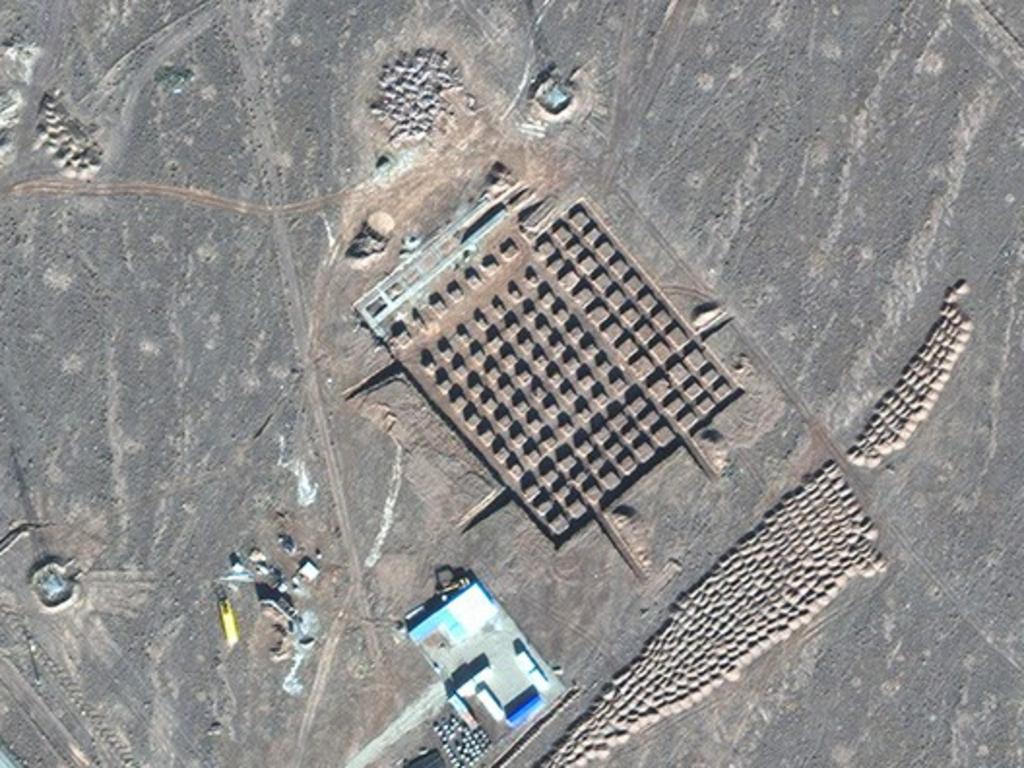US warns of ‘grave consequences’ if Iran fails on nuclear talks
The White House has reiterated its threats again Iran if the country doesn’t move forward on nuclear talks while Israel warns ‘the military option’ would become ‘inevitable’ if talks failed.

The White House has warned of “grave consequences” if Iran doesn’t agree to a deal on its nuclear program, as Israel and Tehran dug in ahead of talks between Washington and Iran at the weekend.
US press spokeswoman Karoline Leavitt told reporters on Wednesday (AEDT) Tehran was “moving in” the direction of a deal with Washington over its program but warned: “The president has reimposed crippling sanctions on the Iranian regime.
“If they don’t choose to move forward with diplomacy and a deal, which is the direction we do see them headed in, there will be grave consequences.”
Earlier on Wednesday, Israeli Prime Minister Benjamin Netanyahu made a condition of any deal the destruction of Tehran’s nuclear facilities, as Iran officials said they would not dismantle their program.
Although Tehran had said a new deal could be agreed with the United States provided Washington shows sufficient goodwill in the upcoming talks, senior officials told Reuters the country’s defence was “non-negotiable.”
“Trump wants a new deal: end Iran’s regional influence, dismantle its nuclear program, and halt its missile work. These are unacceptable to Tehran. Our nuclear program cannot be dismantled,” an official told the news agency.
“Our defence is non-negotiable. How can Tehran disarm when Israel has nuclear warheads? Who protects us if Israel or others strike?” said another official.
Following a meeting with Donald Trump at the White House on Tuesday (local time), Mr Netanyahu said in a video statement that “we agree that Iran will not have nuclear weapons”.
“This can be done in an agreement, but only if … they go in, blow up (Iran’s) facilities, dismantle all the equipment, under American supervision”, he said, adding that if talks drag on, “then the military option becomes inevitable”.
Israeli media reports that Mr Netanyahu was only told of the planned talks when he arrived at the White House on Tuesday (AEDT).
Mr Netanyahu believed he was being called to the White House at short notice to discuss tariffs, only to be informed by US Middle East envoy Steve Witkoff of the real reason for his visit once he landed, Israel’s Channel 12 reports.
When he met with Mr Trump soon after, Mr Netanyahu told the President the only acceptable deal would include destroying Iran’s nuclear facilities, and introduced the need for military action if necessary. However Mr Trump did not give any commitments, saying only that there were 60 days from Saturday allocated for the talks.
Iran’s Foreign Minister Abbas Araghchi said the country’s principal aim remained the lifting of sweeping US sanctions. Their reimposition by Mr Trump in 2018 has dealt a heavy blow to the Iranian economy.
Mr Trump made the surprise announcement that his administration would open “direct” talks with Iran during the White House meeting with Mr Netanyahu, while Mr Araghchi insisted his negotiations with Mr Witkoff on Saturday would be “indirect”.
“We will not accept any other form of negotiation,” Mr Araghchi told official media.
“The format of the negotiations … is not the most important thing in my view. What really counts is the effectiveness or otherwise of the talks.
“If the other side shows enough of the necessary willingness, a deal can be found … The ball is in America’s court.”
Speaking in the Oval Office, Mr Trump said he was hopeful of reaching a deal with Tehran, but warned that the Islamic republic would be in “great danger” if the talks failed.
Mr Netanyahu was a bitter opponent of the 2015 agreement between Iran and Britain, China, France, Germany, Russia and the United States which Mr Trump later abandoned.
In a column in the Washington Post on Wednesday, Mr Araghchi wrote: “To move forward today, we first need to agree that there can be no ‘military option,’ let alone a ‘military solution’.”
“For its part, the United States can show that it is serious about diplomacy by showing that it will stick to any deal it makes. If we are shown respect, we will reciprocate it,” he continued.
Mr Trump’s announcement came after Iran dismissed direct negotiations on a new deal to curb the country’s nuclear activities, calling the idea pointless.
The US president pulled out of the last deal in 2018, during his first presidency, and there has been widespread speculation that Israel, possibly with US help, might attack Iranian facilities if no new agreement is reached.
In Iran, some appeared wary but hopeful that the talks would yield results. “Given the intense pressure on the population today, it seems that government officials have realised that the only solution is to negotiate directly with the United States,” said lawyer Fatemeh Rezai, 28.
“I hope these negotiations will lead to a (positive) outcome and that we will all get through this situation safe and sound.”





To join the conversation, please log in. Don't have an account? Register
Join the conversation, you are commenting as Logout